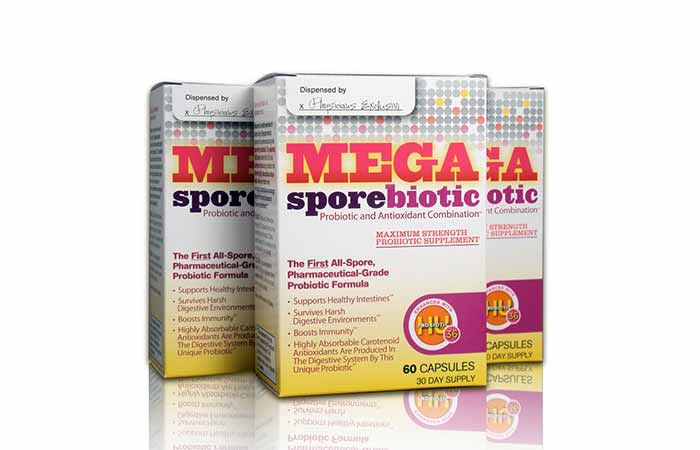Megasporebiotic Side Effects & Benefits
MegaSporeBiotic™ is a 100% spore-based, broad-spectrum probiotic clinically proven to maintain a healthy gut barrier function. Because it’s spore-based, it contains five probiotic species that are spore-forming as well, what’s known as bacillus spores. The blend works to maintain a healthy gut, build immunity, and recondition the digestive system towards proper functioning.
This particular probiotic is a favorite in many households because of how it’s made. The spores are conditioned to only activate once they have arrived at their destination. This assures results, however, there are negative effects such as poisoning because the blend contains human-based and soil-based probiotics. More side effects could include the usual abdominal pains, diarrhea and vomiting, and body weakness.
Megasporebiotic boasts of an excellent probiotic blend with a five-year shelf life that doesn’t need refrigeration and acts as an antibiotic. These are just some of the benefits of the drug. Read more about these amazing benefits plus much more information tight below.
Side Effects
You have already read about the common side effects such as an upset stomach, rare chances of diarrhea or constipation, and mild abdominal pain. However, each of the probiotic species and strains used to make the drug can give you side effects.

To start, probiotic species one, Bacillus Licheniformis is a spore-forming/ soil-based probiotic that’s dormant most of the time until it arrives at the gastrointestinal tract where it activates and colonizes the gut. Because they’re from the soil, they could have some adverse reactions with the body’s interior system including causing;
- Food poisoning – the probiotic strains may not work well with certain proteins and carbohydrates in the body. They can also ferment lactose products in the body causing food poisoning.
- Septicemia – this is a severe case of blood poisoning where a bacterial infection forms in the blood and spreads every including the lungs, skin, and the entire bloodstream
- Peritonitis – This is the inflammation of the peritoneal which is a thin silk-like membrane that coats the inner abdominal wall covering the organs in the abdomen. Because probiotics colonize the gut and hold on to the abdomen, this is a likely infection.
- Ophthalmitis – inflammation of the eye.
Secondly, along with the other soil-based species like Bacillus coagulans and Bacillus subtilis, they don’t blend well with lactose in the body. The toxins in the bacteria can cause an overreaction in the intestines causing severe diarrhea and mitochondrial dysfunction.
Bacillus licheniformis is also known as a human pathogen causing infections that can be hazardous for immunocompromised patients and unwell children. It could cause sepsis, which is a life-threatening health condition that targets the body’s immune system. It’s a reaction to an infection that releases toxins and chemicals into the bloodstream. Sepsis eventually causes the chemicals to spin out of balance which can damage multiple organs in the body.
Lastly, the probiotic can also cause you to be unreactive to antibiotic treatments which means you can’t take medication or they wouldn’t work. They tend to suppress the effects of the antibiotic seeming null and void.
Known Health Benefits
Before we jump into the benefits, you should know the making of MegaSporeBiotic probiotic drug with soil-based probiotics improved their chances of survival in the stomach acid greatly. Being spore-based, they’re only affected in environments that resonate with their purpose. This means that the drug only needs to get to the colon/ large intestines where it can then colonize the region.
For an easier understanding of every probiotic, we divided their benefits according to the ingredients.
Bacillus Licheniformis
Megasporebiotic contains bacillus licheniformis strain SL307™. Its main benefits include;
- Helps to regulate and boost the immune response system
- Aids with protein digestion by releasing digestive enzymes such as protease, α-amylase, β-mannanase, and pectinolytic enzymes needed for the breakdown
- It produces added vitamins to the body such as vitamin B
- Introduces good bacteria in the gut against the presence of bile salts and low gastric pH.
- Produces antibiotic substances, precisely Bacitracin. This is effective in the fight against pathogens acids enzymatic degradation that may occur over time.
Bacillus Indicus HU36™
- Produces RDA levels of carotenoids: lycopene, astaxanthin, beta-carotene, and lutein that aids them to survive gastric transit and prevent degradation.
- Produces quinols and vitamins essential to keep the body healthy and happy.
- The carotenoids found in this strain have also been shown to be able to reduce the risk of certain cancers, especially prostate cancer.
Bacillus Subtilis HU58™
The Bacillus subtilis HU58 is known to produce vitamin K2 and nattokinase which aids in healthy GALT(Gut Associated Lymphoid Tissue) development. It can also aid with enhanced digestive health and development especially those associated with ileal and amino acids digestibility. Moreover, it strengthens the immune system, priming it for an adaptive immune response.
Bacillus Clausii
The specific strain, SC109™ mainly supports the immune system and improves the efficiency of antibiotic treatment. It has anti-inflammatory properties that boost any antiviral and antibacterial activity in the body. There have been studies that show Bacillus clausii aids with allergic reactions and viral diarrhea amongst children.
Bacillus Clausii can also inhibit the growth of pathogens in the gastrointestinal tract in three distinct mechanisms.
Bacillus Coagulans
Last, but not least, Bacillus coagulans, strain SC208™ has the highest percentage of lactic acid and equally supports the immune dictionary of the body. It’s a unique probiotic as it has both human and soil-based probiotic features mainly because of the presence of lactic acid common with Lactobacillus species.
Bacillus coagulans has proven successful in the prevention and treatment of diarrhea, especially antibiotic-associated diarrhea, flatulence, vaginitis, and irritable bowel syndrome and disorders.
Sources
- https://microbiomelabs.com/home/products/megasporebiotic/
- http://www.ncbi.nlm.nih.gov/pmc/articles/PMC91618/
- http://www.ncbi.nlm.nih.gov/pmc/articles/PMC3326966/
- http://www.ncbi.nlm.nih.gov/pubmed/22918867
- http://jcm.asm.org/content/33/11/3070.short
- http://www.ncbi.nlm.nih.gov/pubmed/16509927
- http://www.ncbi.nlm.nih.gov/pmc/articles/PMC91618/
- https://hormonedetoxshop.com/megasporebiotic/
- https://jasbsci.biomedcentral.com/articles/10.1186/s40104-017-0168-2
- https://www.synergialifesciences.com/bacillus-indicus-strain-spore-probiotic-HU36.html
- https://www.synergialifesciences.com/bacillus-subtilis-spore-probiotic-HU58.html
- https://www.ncbi.nlm.nih.gov/pmc/articles/PMC1936284/
- https://pubmed.ncbi.nlm.nih.gov/18181712/
- https://pubmed.ncbi.nlm.nih.gov/3263801/